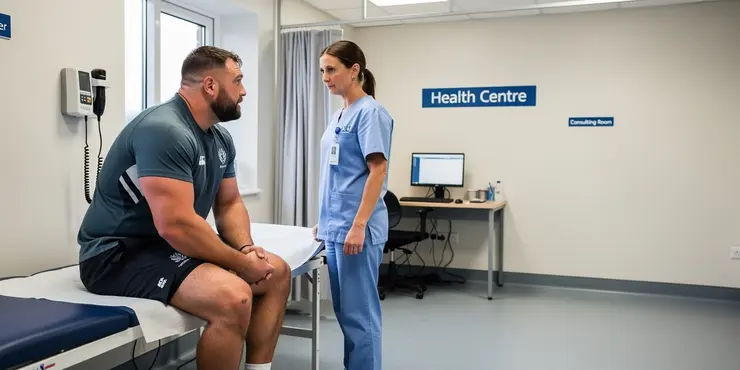
Find Help
More Items From Ergsy search
-
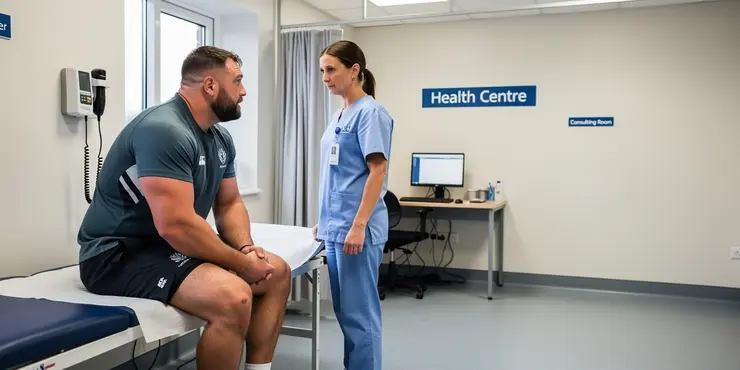
Are Concussions common in Rugby?
Relevance: 100%
-
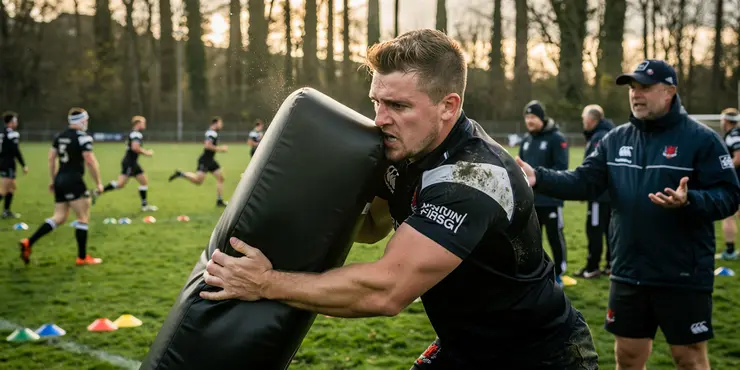
What causes concussions in rugby?
Relevance: 96%
-
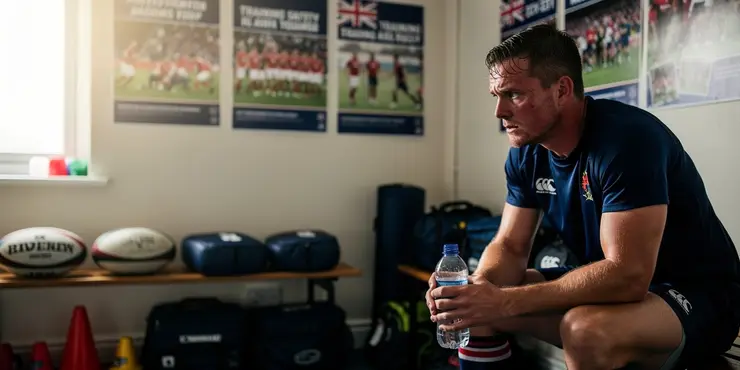
Is there a protocol for managing concussions in rugby?
Relevance: 93%
-
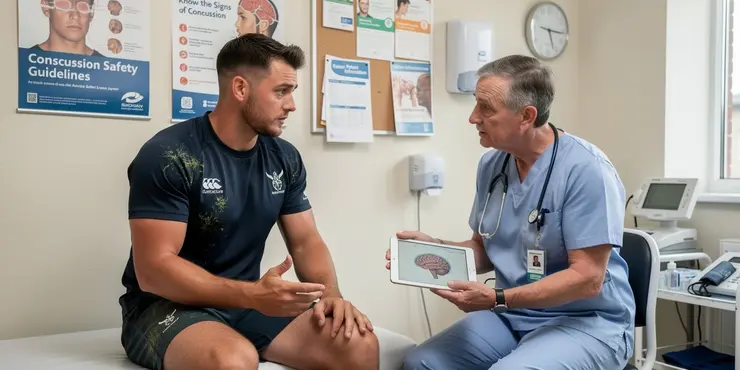
Are helmets required in rugby to prevent concussions?
Relevance: 93%
-
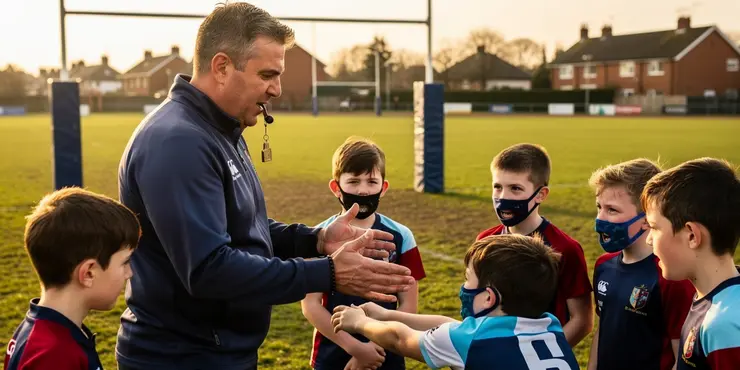
How can concussions be prevented in rugby?
Relevance: 89%
-
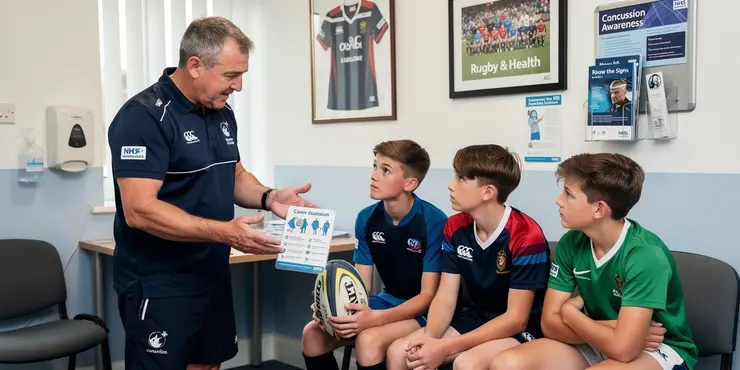
Is there a difference in concussion rates between amateur and professional rugby?
Relevance: 88%
-

How do concussions impact long-term health in rugby players?
Relevance: 85%
-
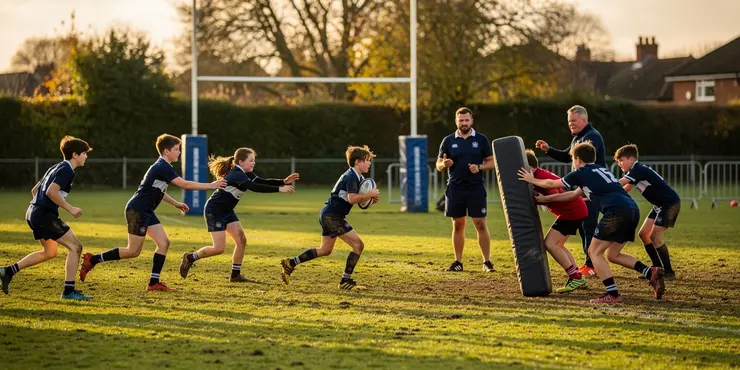
What age groups are most at risk for concussions in rugby?
Relevance: 85%
-

What support is available for rugby players who suffer concussions?
Relevance: 81%
-

Is there any way to prevent concussions?
Relevance: 60%
-
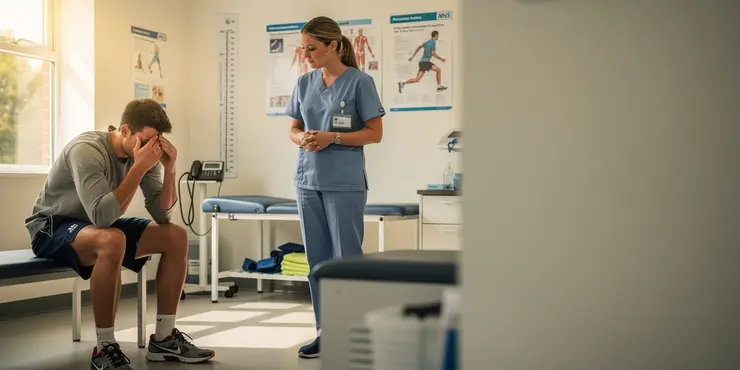
What is Concussion?
Relevance: 59%
-
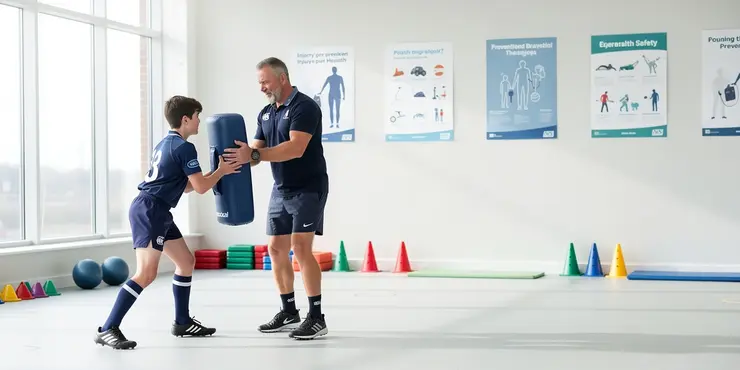
How can concussions be prevented?
Relevance: 59%
-
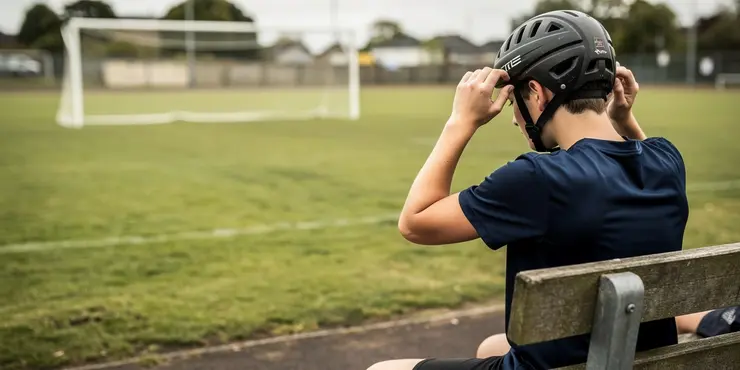
How can concussions be prevented?
Relevance: 57%
-
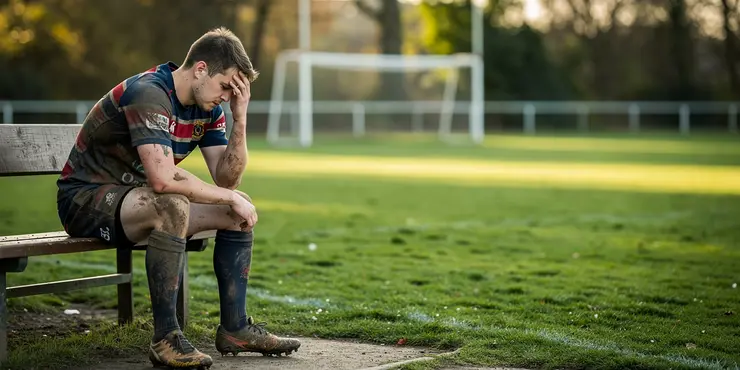
Can playing sports increase the risk of a concussion?
Relevance: 54%
-
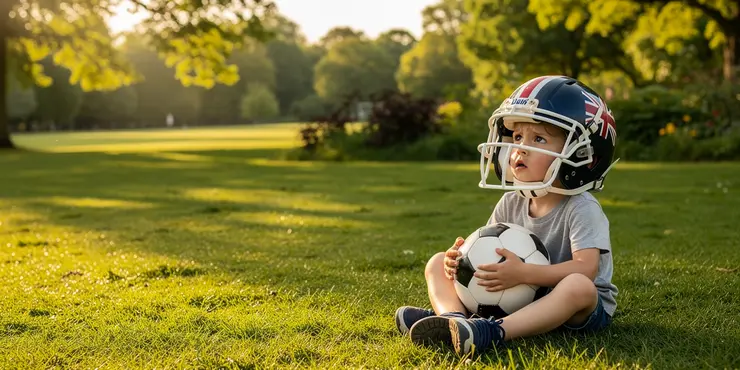
Are children more susceptible to concussions than adults?
Relevance: 53%
-
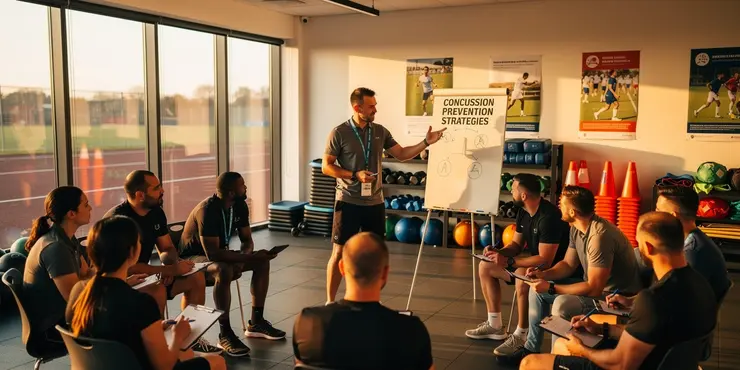
Is training available for coaches to help prevent concussions?
Relevance: 49%
-

What role do schools play in managing concussions?
Relevance: 49%
-

How is a concussion diagnosed?
Relevance: 46%
-

Is headache a symptom of a concussion?
Relevance: 46%
-

How is a concussion diagnosed?
Relevance: 46%
-

What are common symptoms of a concussion?
Relevance: 44%
-

Is it safe to sleep after a concussion?
Relevance: 44%
-

Is it safe to sleep after a concussion?
Relevance: 44%
-

Can a concussion cause memory problems?
Relevance: 43%
-

Can concussions lead to mental health issues?
Relevance: 42%
-

Can concussions occur without a direct blow to the head?
Relevance: 41%
-

Should people with a concussion avoid screens and technology?
Relevance: 40%
-

When is it safe to return to normal activities after a concussion?
Relevance: 40%
-

When is it safe to return to normal activities after a concussion?
Relevance: 39%
-

What immediate steps should be taken if someone has a concussion?
Relevance: 39%
-
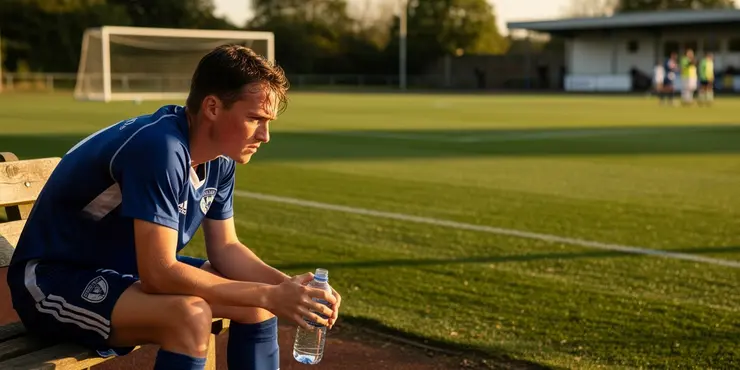
Can players return to play on the same day after a suspected concussion?
Relevance: 39%
-

Advice on sports injuries
Relevance: 15%
-

Are there any exercises to avoid during pregnancy?
Relevance: 7%
-

Is it safe to participate in group sports while pregnant?
Relevance: 7%
-

Can I breastfeed immediately after a Caesarean section under spinal anaesthesia?
Relevance: 7%
-

What are the symptoms of whiplash?
Relevance: 6%
-

Staying Active: National Health Campaigns Promoting Physical Well-being
Relevance: 4%
-

Can first aid skills help in daily life?
Relevance: 3%
The Prevalence of Concussions in Rugby
Rugby is a high-impact sport characterized by physicality, speed, and frequent collisions. Played widely across the United Kingdom, it enjoys a strong following both at the amateur and professional levels. However, the sport’s inherent characteristics have raised concerns about player safety, particularly related to head injuries and concussions.
Understanding Concussions in Rugby
A concussion is a type of traumatic brain injury caused by a blow or jolt to the head that can disrupt normal brain function. In rugby, players are susceptible to concussions due to tackles, rucks, mauls, and scrums, where head-to-head or head-to-ground impacts are frequent. Symptoms can include headaches, dizziness, confusion, and memory loss, and while some symptoms are apparent immediately, others may emerge after a delay. Recognizing and properly managing concussions is crucial to prevent long-term damage.
Statistical Insights into Rugby-Related Concussions
Research indicates that rugby has one of the highest incidences of concussion among contact sports. Studies conducted in the UK and other rugby-playing nations have found significant rates of reported and recorded concussions during professional matches. However, the actual figures might be higher due to under-reporting, especially at amateur levels, where medical resources and protocols might not be as robust as in professional settings.
Efforts to Mitigate Concussions in Rugby
To address the prevalence of concussions, rugby authorities in the UK, including the Rugby Football Union (RFU), have implemented several strategies. These include awareness campaigns, promoting safe tackling techniques, and strict adherence to return-to-play protocols that require medical clearance before a concussed player resumes competition. Additionally, the introduction of Head Injury Assessments (HIAs) in professional rugby allows medical staff to evaluate players for concussions during matches, minimizing risks of playing with an undiagnosed head injury.
Conclusion
Concussions remain a significant concern within the sport of rugby due to the frequent high-impact collisions. While concerted efforts are being made to mitigate risks and enhance player safety, ongoing education, and adherence to safety measures are paramount to reducing the incidence and impact of concussions in rugby. As awareness continues to grow, it is hoped that players, coaches, and officials will work together to maintain rugby’s competitive spirit while prioritizing health and well-being.
The Prevalence of Concussions in Rugby
Rugby is a sport where players often hit each other. It is very popular in the United Kingdom. Many people play it for fun and professionally. Because rugby is a rough sport, some people worry about the players getting hurt, especially their heads.
Understanding Concussions in Rugby
A concussion is when your brain gets hurt. This can happen if something hits your head. In rugby, players can get concussions when they tackle or fall. Sometimes, players knock heads or hit their heads on the ground. If a player gets a concussion, they might have headaches or feel dizzy and confused. They might also forget things. Sometimes these problems happen right away, but other times they take longer to show up. It's important to take concussions seriously to keep the brain safe.
Statistical Insights into Rugby-Related Concussions
Studies show that rugby players get concussions often. This is true when compared to other sports where players also hit each other. Researchers in the UK and other countries found many concussions in rugby games. But, the real number might be even higher because not all concussions are reported. This is especially true for players who play for fun and not professionally. They might not have doctors to help them.
Efforts to Mitigate Concussions in Rugby
To help with the problem of concussions, rugby leaders in the UK, like the Rugby Football Union (RFU), are trying many things. They teach players and coaches how to tackle safely. They also make rules that players must follow before playing after a concussion. In professional rugby, they use special checks during games to see if players have concussions. This helps keep players safe.
Conclusion
Concussions are a big concern in rugby because players often hit each other hard. Rugby organizations are working hard to make the sport safer. They educate people and make safety rules. Everyone hopes that players, coaches, and referees will work together to keep rugby fun and safe. By knowing more, they can help protect everyone's health while enjoying the game.
Frequently Asked Questions
Are concussions common in rugby?
Yes, concussions are relatively common in rugby due to the physical nature of the sport, which involves frequent contact and tackles.
What causes concussions in rugby?
Concussions in rugby are typically caused by impacts to the head during tackles, collisions with other players, or falls to the ground.
How can concussions be prevented in rugby?
Concussions can be minimised with proper training on safe tackling techniques, wearing protective headgear, and adherence to World Rugby's safety guidelines.
What are the symptoms of a concussion?
Symptoms may include headache, confusion, dizziness, nausea, balance problems, and memory issues. It's important to seek medical advice if a concussion is suspected.
Is there a protocol for managing concussions in rugby?
Yes, World Rugby has established a Head Injury Assessment (HIA) protocol to manage suspected concussions during matches and training.
How long does it take to recover from a concussion?
Recovery times can vary, but most players recover within 7-14 days. However, a gradual return-to-play protocol must be followed to ensure full recovery.
Can players return to play on the same day after a suspected concussion?
No, players with suspected concussions should not return to play on the same day. They must undergo a thorough medical assessment and follow return-to-play protocols.
What is the Head Injury Assessment (HIA) protocol?
The HIA protocol is a three-stage process used to assess and manage head injuries during rugby matches, ensuring players receive proper evaluation and care.
Are helmets required in rugby to prevent concussions?
No, helmets are not required. Soft headgear is optional but does not eliminate the risk of concussions. It may provide some protection against superficial head injuries.
What age groups are most at risk for concussions in rugby?
All age groups can be at risk, but younger players may be more susceptible due to their developing brains and potentially less refined tackling skills.
How do concussions impact long-term health in rugby players?
Repeated concussions can lead to long-term health issues such as chronic traumatic encephalopathy (CTE), so proper management and recovery are crucial.
Is training available for coaches to help prevent concussions?
Yes, various organisations offer training courses for coaches to educate them on concussion awareness, prevention strategies, and safe tackling techniques.
Are there any recent changes to concussion protocols in rugby?
World Rugby frequently reviews and updates concussion management protocols to align with the latest medical research and improve player safety.
Is there a difference in concussion rates between amateur and professional rugby?
Concussion rates may be higher in professional rugby due to the increased speed and intensity of play, though both levels require strict adherence to safety protocols.
What support is available for rugby players who suffer concussions?
Support includes medical evaluation, structured recovery programs, and access to healthcare professionals who specialise in sports injuries.
Do people often get head injuries playing rugby?
Yes, head injuries called concussions happen a lot in rugby. This is because rugby is a rough sport with lots of hitting and tackling.
If you want to understand better, here are some tips:
- Ask someone to read the text with you.
- Use a ruler or your finger to follow the words as you read.
- Look for pictures or videos about rugby to see what the sport is like.
What makes players hit their heads in rugby?
Rugby is a sport where players run, tackle, and fall.
Sometimes, they bump their heads together, or they hit their head on the ground.
When this happens, a player can get a concussion.
A concussion is when the brain gets hurt. It can make you feel dizzy or confused.
Players wear helmets to help keep their heads safe.
Coaches teach players how to tackle safely to avoid getting hurt.
If a player gets a concussion, they should rest and see a doctor.
Reading tools can help you understand this better. Try using apps that read out loud to you.
In rugby, players can get hurt in the head. This can happen when they crash into other players or fall down.
How can we stop concussions in rugby?
Concussions are head injuries. They can happen in rugby.
Here are some ways to help stop concussions:
- Wear a good helmet. It can protect your head.
- Learn to tackle safely. Coaches can teach you how.
- Play by the rules. They keep everyone safe.
- If you feel hurt, tell an adult. Stop playing and get help.
Here are some tools to help:
- Watch videos to learn safety tips.
- Use pictures or drawings to understand better.
Staying safe is very important when playing rugby!
You can lower the chance of getting a concussion by doing a few things. You can learn how to tackle safely in sports, wear a helmet, and follow the World Rugby safety rules.
What happens when you bump your head?
If you hit your head hard, you might have a concussion. Here are some signs:
- Your head hurts.
- You feel dizzy or confused.
- You have trouble remembering things.
- You feel sleepy or very tired.
- You feel sick or throw up.
If you think you have a concussion, tell an adult. They can help you see a doctor.
You might have a headache, feel confused, or dizzy. You could feel sick or have trouble keeping your balance. You might also have problems with your memory. If you think you have a concussion, it's important to see a doctor.
Is there a plan to help when someone gets a head injury in rugby?
Yes, World Rugby has a plan to help people with head injuries. This plan is called the Head Injury Assessment, or HIA. It helps check for concussions during games and practices.
How long until you feel better after hitting your head?
Getting better might take different amounts of time, but most players feel better in 7 to 14 days. They should return to playing sports slowly to make sure they are fully okay.
Can players play again on the same day if they think they hurt their head?
If a player thinks they hit their head and feels dizzy or confused, they should not play anymore that day. They need to rest and see a doctor. Playing again can be dangerous.
Players can use the "Stop, Ask, Go" rule: Stop playing if hurt, Ask for help, and Go to a doctor.
No, players who might have a concussion should not play again on the same day. They need to see a doctor and follow steps to get better before playing again.
What is the Head Injury Check (HIA) Rule?
The Head Injury Check is a set of steps. It helps doctors know if a player hurt their head during a game. It keeps players safe.
If a player hurts their head, they must leave the game. They see a doctor for a check-up. This makes sure they are okay. If they are well, they can return to play.
When reading, take your time. Use a finger to follow the words. Ask an adult if you need help understanding.
The HIA protocol helps check and care for head injuries in rugby games. It has three steps to make sure players get the right help.
Do rugby players need helmets to stop head injuries?
No, you don’t have to wear helmets. Soft hats are allowed but they won’t stop head bumps. They might help with cuts and bruises on the head.
Who can get hurt the most from head knocks in rugby?
Kids and teenagers who play rugby can get head knocks a lot. Make sure to wear a helmet and listen to your coach's safety tips.
Talk to a parent or teacher if you need help understanding this.
All ages can get hurt, but younger players might get hurt more easily because their brains are still growing and they might not know how to tackle properly yet.
What happens to rugby players' health if they hit their head a lot?
When rugby players hit their head hard, it is called a concussion. This can happen when they play the game.
Having many concussions can be bad for their health later in life. It might make it hard for them to think clearly or remember things.
Players can wear helmets to keep safe and help their heads not get hurt as much.
Talking to a doctor can help rugby players understand how to stay safe and healthy.
Getting hit on the head too many times can make you sick later on. It's important to rest and take care of yourself if you bump your head.
Can coaches learn how to stop head injuries?
Yes, there are groups that teach coaches about concussions. They have lessons on how to see if someone has a concussion, how to stop them from happening, and how to play safely.
Have the rules for handling concussions in rugby changed recently?
Rugby is a sport where players can get hurt. Sometimes, players can get a concussion. A concussion is a type of head injury. It is very important to keep players safe.
Have the rules changed for how rugby helps protect players with concussions?
To understand better, you can ask someone for help or use pictures to learn. You can also watch videos about rugby safety.
World Rugby often checks and changes how they handle head injuries to keep players safe. They use the newest research to make things better.
Do more amateur or professional rugby players get head bumps?
People who play rugby for a job might get more head bumps because they play faster and harder. It is really important for everyone to follow safety rules to stay safe.
What help can rugby players get if they hit their head?
If a rugby player hits their head, they can get hurt inside their brain. This is called a concussion.
Here are some ways they can get help:
- Ask a doctor: Players should see a doctor to check if they have a concussion.
- Take a break: Rest is important. Players need to stop playing to heal.
- Talk to a coach: Coaches can give advice and help make a return plan.
- Follow a recovery plan: Players should follow steps to get better. This includes rest, light activity, and slowly getting back to the game.
- Use a checklist: A list can help players remember what to do if they feel bad.
- Learn more: Watch videos or read easy guides to know about concussions.
You can get help with different things. This includes visiting a doctor, joining special programs to help you get better, and talking to healthcare workers who know a lot about sports injuries.
Useful Links
This website offers general information and is not a substitute for professional advice.
Always seek guidance from qualified professionals.
If you have any medical concerns or need urgent help, contact a healthcare professional or emergency services immediately.
Some of this content was generated with AI assistance. We’ve done our best to keep it accurate, helpful, and human-friendly.
- Ergsy carfully checks the information in the videos we provide here.
- Videos shown by Youtube after a video has completed, have NOT been reviewed by ERGSY.
- To view, click the arrow in centre of video.
- Most of the videos you find here will have subtitles and/or closed captions available.
- You may need to turn these on, and choose your preferred language.
- Go to the video you'd like to watch.
- If closed captions (CC) are available, settings will be visible on the bottom right of the video player.
- To turn on Captions, click settings .
- To turn off Captions, click settings again.
More Items From Ergsy search
-

Are Concussions common in Rugby?
Relevance: 100%
-

What causes concussions in rugby?
Relevance: 96%
-

Is there a protocol for managing concussions in rugby?
Relevance: 93%
-

Are helmets required in rugby to prevent concussions?
Relevance: 93%
-

How can concussions be prevented in rugby?
Relevance: 89%
-

Is there a difference in concussion rates between amateur and professional rugby?
Relevance: 88%
-

How do concussions impact long-term health in rugby players?
Relevance: 85%
-

What age groups are most at risk for concussions in rugby?
Relevance: 85%
-

What support is available for rugby players who suffer concussions?
Relevance: 81%
-

Is there any way to prevent concussions?
Relevance: 60%
-

What is Concussion?
Relevance: 59%
-

How can concussions be prevented?
Relevance: 59%
-

How can concussions be prevented?
Relevance: 57%
-

Can playing sports increase the risk of a concussion?
Relevance: 54%
-

Are children more susceptible to concussions than adults?
Relevance: 53%
-

Is training available for coaches to help prevent concussions?
Relevance: 49%
-

What role do schools play in managing concussions?
Relevance: 49%
-

How is a concussion diagnosed?
Relevance: 46%
-

Is headache a symptom of a concussion?
Relevance: 46%
-

How is a concussion diagnosed?
Relevance: 46%
-

What are common symptoms of a concussion?
Relevance: 44%
-

Is it safe to sleep after a concussion?
Relevance: 44%
-

Is it safe to sleep after a concussion?
Relevance: 44%
-

Can a concussion cause memory problems?
Relevance: 43%
-

Can concussions lead to mental health issues?
Relevance: 42%
-

Can concussions occur without a direct blow to the head?
Relevance: 41%
-

Should people with a concussion avoid screens and technology?
Relevance: 40%
-

When is it safe to return to normal activities after a concussion?
Relevance: 40%
-

When is it safe to return to normal activities after a concussion?
Relevance: 39%
-

What immediate steps should be taken if someone has a concussion?
Relevance: 39%
-

Can players return to play on the same day after a suspected concussion?
Relevance: 39%
-

Advice on sports injuries
Relevance: 15%
-

Are there any exercises to avoid during pregnancy?
Relevance: 7%
-

Is it safe to participate in group sports while pregnant?
Relevance: 7%
-

Can I breastfeed immediately after a Caesarean section under spinal anaesthesia?
Relevance: 7%
-

What are the symptoms of whiplash?
Relevance: 6%
-

Staying Active: National Health Campaigns Promoting Physical Well-being
Relevance: 4%
-

Can first aid skills help in daily life?
Relevance: 3%


